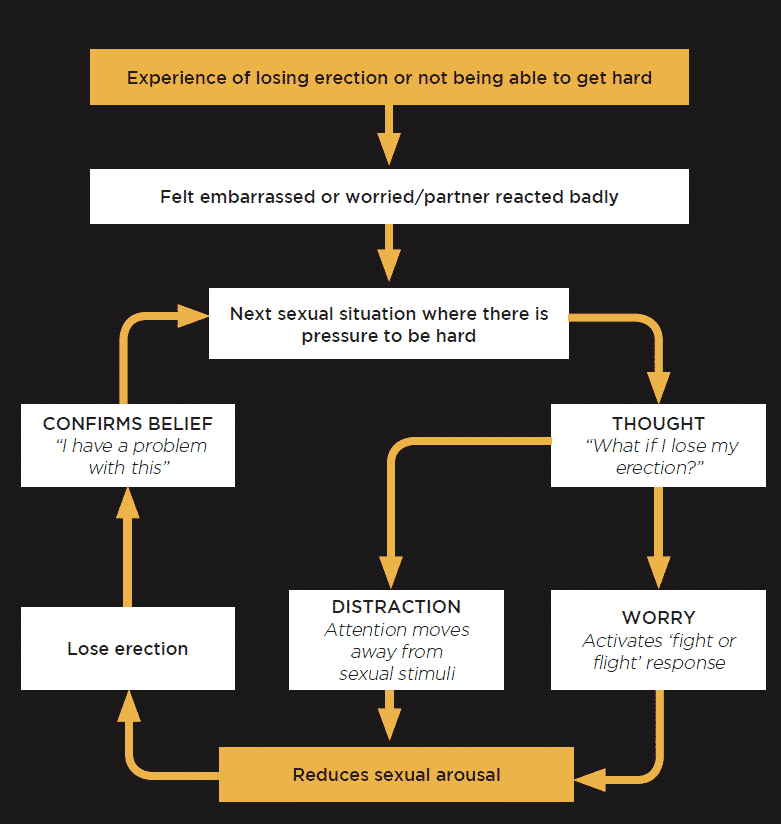Some men worry about getting or staying hard, perhaps if they feel a partner will react badly, or if they find it embarrassing. The problem is that worrying about it can make it more likely. This happens as the physiological processes that control our sexual arousal and our anxiety (fight or flight) response, work against each other. For evolutionary reasons, the fight or flight response usually wins, and this shows itself in interrupting sexual arousal.
This process would be useful if there was a real threat of danger For example if you were having sex and all of a sudden a fire broke out. However, these kinds of emergencies during sex are not that common. Instead, our fight or flight response is activated by sex-related anxieties like:
- What if they think my dick is too small?
- How do I look from that angle?
- They look bored, they mustn’t like this
- I hope I don’t get syphilis again
- I probably should have used a condom
- They’re not that into me
- What if I don’t stay hard or cum too soon?
It’s normal to have a variety of worries and thoughts during sex, all of us do. But if we get more focused on them rather than what’s hot about the scenario, or our own enjoyment and sensation, a negative cycle can be created. Our diagram below demonstrates how this can perpetuate.
A cycle of thoughts like this can impact on your ability to get and stay hard. The more it happens, the more you worry about it. The more you worry about it, the more it happens.
Our brain needs to be able to pay attention to what’s hot, to continue to feel turned on. The more attention we pay to non-sexy or worrying thoughts, the less attention we have available for what’s erotic or feels good.
The good news is that there is plenty that you can do to increase your confidence so that you can break this cycle. Taking time to practise these techniques will help you maintain a positive thought process, whereby the more this goes well, the less likely you are to lose your erection.
What’s also great about the exercises below, is that practising them regularly alone can have a positive impact on what happens when you are with someone else.
If you are someone who uses condoms, but your worries about stopping to put a condom on are causing a problem, building condom use into these exercises is a great way to improve things.
OUR STEP-BY-STEP GUIDE
STEP 1
What types of sex are best for your arousal?
People sometimes believe that they should be able to get hard regardless of the circumstances. This just isn’t true. The circumstances in which we’re having sex, who it’s with, what types of sex and what’s going on around us are crucial to making sure it’s a situation that actually turns us on rather than off.
For example, Jon was worried about staying hard as he found he kept losing his erection and some sexual partners had reacted negatively. Most of the sex he’d been having recently was with casual partners at sex parties – which wasn’t his favourite way to have sex. He started to get very worried about it. Jon would worry about how hard he was. If he was receiving oral sex, this worry would undoubtedly impact on his attention, distracting him from noticing the sensation or anything hot about the situation. This worry would also switch on his fight or flight response, turning down his sexual arousal and encouraging blood flow out of the penis.
It’s important to notice that Jon wasn’t actually that turned on in the first place. This means it didn’t take much worry or distracting thought to tip the scales and interrupt it. Jon actually finds having sex with other guys in the same room a real turn off. He finds he compares himself negatively to how others look and often feels judged by those watching him. It’s really important to him that people find him attractive and really want him to get turned on. At sex parties, he was plagued by thoughts like ‘they only want to have sex with me as I’m here and convenient, it’s not me they want’.
How to understand your conditions for good sex
Spend some time reflecting on the three best, and the three worst sexual experiences that you can recall. Write down all the things which made these encounters hot or not. Think about how you felt about yourself at that moment. What was going on in your mind? The connection you had with them? Consider the types of sexual acts or touches between you, how you felt they felt about you, the environment around you, the context of how the sex happened, whether there were condoms or not, chems or not. Paint as broad a picture as you can.
Here’s what Jon wrote:
HOT
- I felt good about myself and my body
- I could see they were into me
- They talked a lot which I like
- I liked the way they kissed
- I felt totally absorbed in the moment
- There was only two of them and me I trusted them, even though we didn’t really know each other
- They were into the same types of sex as me
- I found them really hot
NOT
- They seemed distracted and kept checking their phone
- I didn’t like the way they didn’t like to kiss
- I felt like there were much hotter people than me in the room who they must have wanted
- I felt turned off by some things they did
- I was worried about being a good top as I don’t usually top
- They were high and I wasn’t
- Was worried about not using a condom but didn’t want to lose my erection
For Jon, having sex which doesn’t meet his conditions for good sex will make it more likely that he’ll struggle to stay hard (as well as making sex not that great for him generally).
Sometimes we can find ourselves getting into habits of sex that are convenient rather than sex we actually want. One of the most important factors dictating how your body responds is seeking out sex and sexual partners that fit your individual conditions for a good sexual experience.
Explore this for yourself once you’ve made your list by making a concerted effort to have more sex that fits your conditions better, and less sex that doesn’t. This might mean changing where you have sex, who with, or how. You may even turn down some sex that otherwise is convenient. What do you notice about your arousal? Your distraction? What happens with the strength of your erections? With your pleasure?
Making sure you have more sex that fits with your preferences makes staying hard a lot easier.
STEP 2
Building confidence alone
If you feel that you’re having the type of sex that really works for you, but you’ve gotten into the cycle of worrying about staying hard, there is a technique you can practise alone to break this cycle. It can build your confidence, kickstarting the positive cycle. This technique is all about having lots of experience losing and gaining erections alone, and this is how you practice it;
- Make time 2-3 times a week when alone and you have the time, headspace and inclination to masturbate
- Use whatever mental stimulation works for you, be that porn, fantasy or a memory to get turned on, and touch your penis in the way that you like
- Imagine a scale of 0-10 where 0 is a completely soft penis, 1-3 is starting to feel the sensations of arousal and increased blood flow, 4-6 is a semi-erect penis and 7 is hard enough for penetrative sex. It’s normal for the strength of your erection to fluctuate between 7-10 throughout a sexual experience (or even go down to a semi then get hard again), but 7 is the number you should focus on for this task
- When your penis gets to about 7-10 for firmness, stop touching it, or stop watching the porn or fantasising, and let it go down
- It doesn’t have to go down to a 0, just a lower number than it was
- Then start the stimulation again, and get to a 7 again
- Let it go down the same way you did last time
- The final time you start the stimulation again, you can carry on until you cum
This technique works to build your confidence as it demonstrates that your erection comes back as long as pressure is low and arousal is high. It also helps break the cycle of worrying about losing it as you might find that;
- It’s more difficult to lose it than you think
- As long as you don’t panic it comes back quicker than you think
- Some men find it comes back even harder a second or third time
Practice this technique a few times a week for a few weeks or until you feel more confident. You’ll find that the more you do this alone, the harder it is for your brain to fill your head with negative thoughts.
STEP 2 – Advanced
Building confidence alone
Once you’re confident with Step 1, you can try a more advanced version of it, by taking away any external stimulation like porn. Instead, amplify your arousal using your mind only. One way to do this is by focusing your attention to sensations that you feel in your whole body (i.e. not just limited to your penis). If you find your mind wandering, don’t worry, just gently bring it back to paying attention to the sensations. Research shows that people who are able to pay more attention to sensations in their body (essentially mindfulness techniques applied to sex) experience higher levels of arousal and desire than people who don’t. The more practice you get at shifting your attention in this way, the more you can choose to move your attention from distraction or worries during sex with someone else to more positive thoughts or sensations.
Paying close attention to your body in this way is a good habit to practice even when you no longer have concerns about your erections. Paying close attention to sensation can also amplify the sensations in your body, which means that sex can feel more pleasurable.
STEP 3
Building confidence is about putting all of this into action whilst practising with condoms at the same time
Many men find that if they have been worried about staying hard, condom use can be difficult. Sometimes this is about the feel and fit of the condom. Sometimes it’s about the fact that the time you usually put a condom on is the moment just before penetrative sex, and therefore the time you feel the most pressure to stay hard. The final reason some people struggle to stay hard with condoms is that if you’re stopping to get up and get one, or putting it on yourself, there’s a break in sexual stimulation and this can affect sexual arousal.
For this reason, condoms can get associated with a loss of erections over time. When this happens it can be easy to feel like it’s the condom itself rather than the other factors which are making you lose your erection.
Practising with condoms can be a great way to give your brain lots of experience in a situation of low pressure. This allows you to test out differences in feel and fit. We recommend you do this technique with a large range of styles and fits. Practising this technique also allows you to test out what makes the most difference to your sensation; the condom itself, or the impact of your attention being distracted by thoughts of not staying hard.
To do this task, do everything as you did in Step 1, but as soon as your penis gets hard enough for penetration put a condom on and spend a bit of time masturbating with it on, and paying attention to sensation. The condom will likely come off when you let your erection go down, this is a good opportunity to put another one on and again, spend a moment focusing on sensation. The final time you can try a different condom, and leave it on until you cum. Pay attention to whether there were any differences in sensation with each condom.
Top Tip – as well as trying out different types of condoms while you’re masturbating, we recommend you consider whether putting a condom on way before penetration. This can reduce the impact of break-in arousal and the pressure to stay hard at a crucial moment.
STEP 4
Building confidence with a sexual partner
Once you‘ve practised these techniques for a few weeks, you should start to see a change in your confidence in staying hard and hopefully staying hard with condoms. If you have practised this task as we have described regularly and seen no benefit we recommend you get a medical check-up by your GP to rule out a medical cause.
The impact of this new improved confidence on the experience of sex with a partner is that you will be less inclined to have automatic negative thoughts. This, of course, will mean your arousal won’t be interrupted to the same degree. If you’ve also got more practice at only having types of sex with people and in situations that fit your conditions plus have been practising focusing on bodily sensations and being in the moment you will also be more turned on and less distracted. All of this puts you in a really good position to have a very different type of sexual experience.
Despite your new-found confidence it is normal to worry about how all of this will go with a partner, especially the first few times. The key thing here is to focus on making sure the sex you are having is the kind of sex that works for you. Avoid sex that turns you off or makes you feel on edge.
It’s also important to remember that you now know if you don’t worry too much about it and keep paying attention to things that turn you on, it’s not catastrophic if you go softer for a short period. Remember, fluctuation over the course of a sexual encounter is normal. After doing these exercises you should feel confident that it will come back without a problem.
If you find yourself having distracting thoughts about how hard you are, try and use a mindfulness technique to pay attention to one of your senses. For example, you could focus on something you can see that you find hot, or focus on how their body feels to touch, or the sensations in your body. Paying attention to your senses and being in the moment in this way gives less room for distracting thoughts in your brain and amplifies your arousal. This makes it easier to stay hard in a new situation when you might feel a bit more nervous.
It can also be useful to experiment with directing the sex towards types of sex that really turn you on but don’t require you to be hard, especially if these are preferred types of sex for you. For example, if you find giving oral sex a turn on, ask them if you can do this and wait for your erection to come back whilst doing it.
Finally, remember that sex is more than a hard penis. You can enjoy any number of things without having to be hard. The guys you are with will have lost their erection too at some point and probably aren’t judging you as much as you think. The techniques in this guide are designed to increase your confidence with erections and break the negative circle, but they are also about learning to get the sex you want, enjoy it and feel able to be in the moment.


